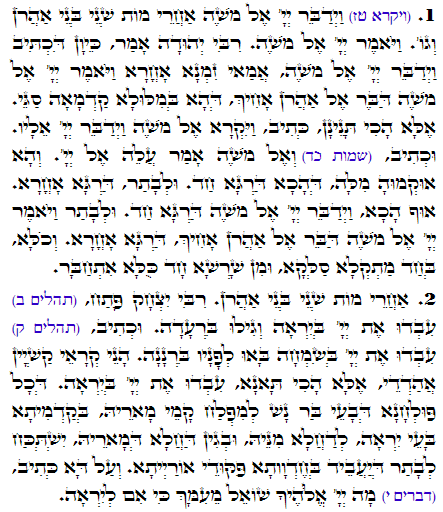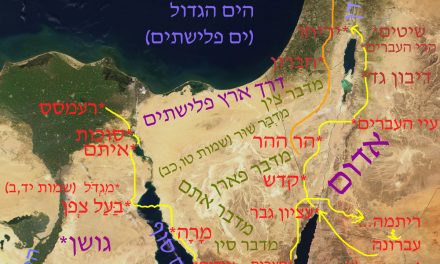Daily Zohar # 1480 – Acharei Mot – Roots for elevation

Hebrew translation:
2. אַחֲרֵי מוֹת שְׁנֵי בְּנֵי אַהֲרֹן. רַבִּי יִצְחָק פָּתַח, (תהלים ב) עִבְדוּ אֶת ה’ בְּיִרְאָה וְגִילוּ בִּרְעָדָה. וְכָתוּב (שם ק) עִבְדוּ אֶת ה’ בְּשִׂמְחָה בֹּאוּ לְפָנָיו בִּרְנָנָה. הַפְּסוּקִים הַלָּלוּ קָשִׁים זֶה עַל זֶה. אֶלָּא כָּךְ שָׁנִינוּ, עִבְדוּ אֶת ה’ בְּיִרְאָה – שֶׁכָּל עֲבוֹדָה שֶׁרוֹצֶה בֶּן אָדָם לַעֲבֹד לִפְנֵי רִבּוֹנוֹ, בָּרִאשׁוֹנָה צָרִיךְ יִרְאָה, לִפְחֹד מִמֶּנּוּ. וּמִשּׁוּם הַפַּחַד שֶׁל אֲדוֹנוֹ יִמָּצֵא אַחַר כָּךְ שֶׁיַּעֲשֶׂה בְשִׂמְחָה אֶת מִצְווֹת הַתּוֹרָה, וְעַל כֵּן כָּתוּב, (דברים י) מָה ה’ אֱלֹהֶיךָ שֹׁאֵל מֵעִמָּךְ כִּי אִם לְיִרְאָה.
3. וְגִילוּ בִּרְעָדָה – שֶׁאָסוּר לָאָדָם לִשְׂמֹחַ יוֹתֵר בָּעוֹלָם הַזֶּה. וְזֶה בְּדִבְרֵי הָעוֹלָם. אֲבָל בְּדִבְרֵי תוֹרָה וּבְמִצְווֹת הַתּוֹרָה צָרִיךְ לִשְׂמֹחַ. אַחַר כָּךְ יִמָּצֵא אָדָם שֶׁיַּעֲשֶׂה בְשִׂמְחָה אֶת מִצְווֹת הַתּוֹרָה, שֶׁכָּתוּב עִבְדוּ אֶת ה’ בְּשִׂמְחָה.
.
Zohar Acharei Mot
The name of the portion means “after the death”
Leviticus 16:1
“ וַיְדַבֵּר יְהוָה, אֶל-מֹשֶׁה, אַחֲרֵי מוֹת, שְׁנֵי בְּנֵי אַהֲרֹן–בְּקָרְבָתָם לִפְנֵי-יְהוָה, וַיָּמֻתוּ.”
“YHVH spoke to Moses after the death of the two sons of Aaron, when they drew near before YHVH and died,”
Verse 2 “ וַיֹּאמֶר יְהוָה אֶל-מֹשֶׁה”, “and YHVH said to Moses”
The Zohar asks why the Torah repeats in the second verse that God is talking to Moses. The first verse should be have been enough. The Zohar explains that there is a difference between the two verses. These are two different levels. In Leviticus 1:1 we find ‘called’ and then ‘spoke’ “וַיִּקְרָא, אֶל-מֹשֶׁה” “and He called Moses” and the “וַיְדַבֵּר יְהוָה אֵלָיו” ‘and YHVH spoke unto him’ First call is the aspect of Malchut, which is judgment and the ‘spoke’ is a higher level and mercy from the aspect of Zeir Anpin.
This portion starts with ‘וַיְדַבֵּר’ ‘spoke’, which is the aspect of judgment and Malchut and then YHVH ‘said’ ‘וַיֹּאמֶר’ to reveal the aspect of Mercy.
The three words of called, spoke and said in Hebrew begin with ‘וי’, the two ‘male’ letters from the YHVH יהוה name. They have the same root that is Zeir Anpin and the YHVH name as a whole. It connects everything together. YHVH name connects the Endless, represented by the invisible dot above the letter Y י, to the material world, lower H ה through the process. Zeir Anpin as the letter V ו is the process that connects Binah, upper H ה to Malchut again.
The action and the death of Nadav and Avihu created a greater channel of light in the Holy tabernacle. Another level of elevation was revealed when God called Moses. In this portion God delivers instruction to Aaron, the high priest, on how to make the highest possible connection to the Holy of Holies. This process can be done only once a year and that is on Yom Kippur. We’ll discuss this more in the next DZs.
[note color=”#f2eaf4″]There is nothing super exciting about the above study. It doesn’t look like there is something to take and apply in our daily lives. What we should know and remember with each Zohar study is that even if we don’t understand the Zohar there is always value added to our souls.
In the above study we learned that God called on Moses in different forms revealing different spiritual levels. The Vav and the Yod express the root of the elevations revealed. Our soul becomes a witness to the events discussed in the Torah and Zohar. Our consciousness and desire connect our souls to the Zohar and we gain access to the spiritual event discussed in the sacred text. [/note]
{||}

 Previous: Acharei Mot
Previous: Acharei Mot 

